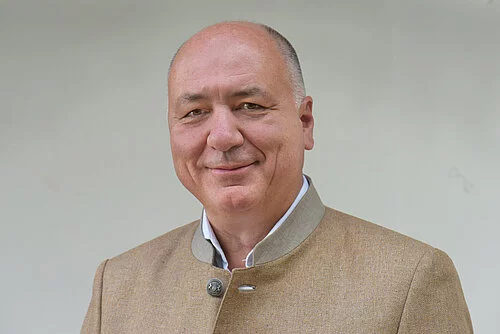UEG Research Prize promotes development of a new therapy for chronic inflammatory bowel diseases
This year, the European umbrella association for gastroenterology awarded its prestigious research prize to Professor Stefan Schreiber to promote research into therapeutic mechanisms of nicotinamide in chronic inflammatory bowel diseases.
The “United European Gastroenterology” (UEG), the umbrella association of European specialist societies for gastroenterology, awarded its renowned UEG Research Prize 2020 to Professor Stefan Schreiber, spokesperson of the Cluster of Excellence “Precision Medicine in Chronic Inflammation” (PMI). With this prize, the UEG will provide funding of €100,000 for Schreiber’s research project on investigating therapeutic mechanisms of nicotinamide in people with chronic inflammatory bowel diseases. The prize was awarded on Sunday, October 11, within the framework of the virtual conference “UEG Week Virtual 2020”. Schreiber, Director of the Institute of Clinical Molecular Biology (IKMB) at Kiel University and Director of the Department of Internal Medicine I at the University Medical Center Schleswig-Holstein (UKSH), Kiel campus, plans to use the funding to take the required steps towards developing a new basic treatment for chronic inflammatory bowel diseases.
Patients with chronic inflammatory bowel diseases such as Crohn's disease and ulcerative colitis suffer from frequent diarrhea, fever and pain, as well as psychological stress. A disturbed immune response leads to a chronic inflammation of the gastrointestinal tract, which flares up again and again in bursts. Schreiber and colleagues from the Cluster of Excellence had shown in previous investigations that a lack of the amino acid tryptophan and its metabolites, such as nicotinamide (a form of the vitamin B3), promoted bowel inflammation in mice and that patients with chronic inflammatory bowel diseases also often suffer from a lack of tryptophan - because tryptophan levels are reduced by the disease. In the animal model, targeted administration of nicotinamide can reduce bowel inflammation if it can be introduced to the large intestine through special release mechanisms.
Now Schreiber and his colleagues plan to investigate whether these observations can be translated to humans and whether nicotinamide can reduce inflammation and prevent further flare-ups in humans, too. A clinical study to investigate the effectiveness of nicotinamide in patients with ulcerative colitis is to start shortly. Alongside this clinical study, Schreiber would like to use the project funded by the UEG Research Prize to investigate the mechanisms activated by administering nicotinamide in chronic bowel inflammation in greater detail.
“What is special about nicotinamide as a potential medicine for chronic bowel inflammation is that it is already used as a food supplement and as such has proven to be safe and free of side effects,” said Schreiber. “At the same time, it is cheap to manufacture, especially compared to treatment options for chronic bowel inflammation available to date,” continued Schreiber.
However, the form in which nicotinamide is currently ingested as a food supplement or through food is not suitable for use against bowel inflammation, as here the active agent is absorbed in the stomach or upper small intestine. Inflammation in ulcerative colitis, however, occurs in the large intestine and in Crohn’s disease in the lower small intestine or large intestine. Schreiber and his colleagues have therefore developed a tablet that delays the release of nicotinamide until it is in the lower small intestine and in the large intestine – i.e. where the inflammation and most of the bowel bacteria can be found. These bacteria, according to the researchers of the Cluster of Excellence PMI, play an important role in inflammation.
“I am very pleased about the UEG Research Prize. It will support us in our efforts to bring many years of research by the Cluster of Excellence PMI on the influence of nicotinamide in chronic bowel inflammation to clinical application,” said Schreiber. “If we understand the mechanisms by which nicotinamide is activated more precisely, we will be able to make better predictions in future about, for example, which patients will particularly benefit from the administration of the agent. That would be an important step towards creating precision medicine, i.e. targeted individual medicine,” continued Schreiber.
Contact:
Prof. Dr. Stefan Schreiber
Department of Internal Medicine I, UKSH
Institute of Clinical Molecular Biology, Kiel University, UKSH
0431/500-15101
s.schreiber@mucosa.de
Further information:
About the Cluster of Excellence PMI
The Cluster of Excellence "Precision Medicine in Chronic Inflammation" (PMI) is being funded from 2019 to 2025 through the German Excellence Strategy (ExStra). It succeeds the "Inflammation at Interfaces” Cluster, which was already funded in two periods of the Excellence Initiative (2007-2018). Around 300 members from eight institutions at four locations are involved: Kiel (Kiel University, University Medical Center Schleswig-Holstein (UKSH), Muthesius University of Fine Arts and Design, Kiel Institute for the World Economy (IfW), Leibniz Institute for Science and Mathematics Education (IPN)), Lübeck (University of Lübeck, University Medical Center Schleswig-Holstein (UKSH)), Plön (Max Planck Institute for Evolutionary Biology) and Borstel (Research Center Borstel - Leibniz Lung Center).
The goal is to translate interdisciplinary research findings on chronic inflammatory diseases of barrier organs to healthcare more intensively, as well as to fulfil previously unsatisfied needs of the patients. Three points are important in the context of successful treatment, and are therefore at the heart of PMI research: the early detection of chronic inflammatory diseases, the prediction of disease progression and complications, and the prediction of individual responses to treatment.
Press office
fbuhse@uv.uni-kiel.de+49 (0)431/880 4682 https://precisionmedicine.de
Cluster of Excellence "Precision Medicine in Chronic Inflammation"
Scientific Office
Head: Dr. habil. Susanne Holstein Postal
Christian-Albrechts-Platz 4, 24118 Kiel, Germany
Contact: Sonja Petermann
+49 (0)431 880-4850, fax: +49 (0)431 880-4894
spetermann@uv.uni-kiel.de
Twitter: PMI @medinflame



